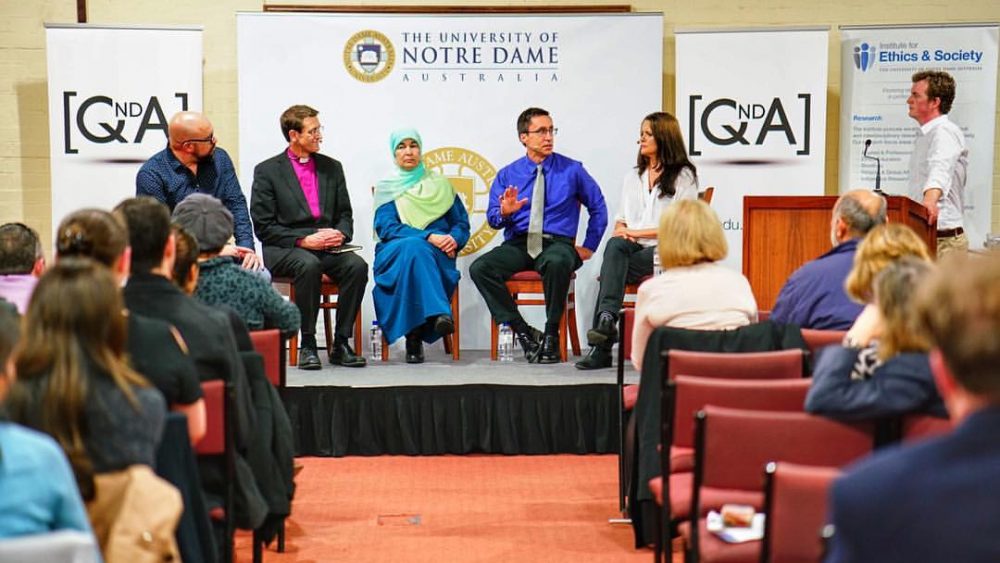Charity must trump theology in gay marriage debate, says Christian thinker
A leading Christian commentator has come out in support of same-sex marriage on the basis of charity rather than theological principle.
Scott Stephens, the ABC’s Online Editor of Religion and Ethics, told a forum last night that he had reached “a profound realisation” of the genuine fear of having a plebiscite felt among many groups.
“I’ve reached the conclusion that the pain that’s caused to people by having the institution of marriage denied them – that pain outweighs whatever theological principle might be salvaged by maintaining a recognisable historical view of marriage,” he told a forum of leaders of different faiths held by the Institute for Ethics and Society at Notre Dame University in Sydney.
“In other words, I think charity has got to come first here.”
Stephens said he had come to that position because the whole gay marriage debate had been corrupted by the “godawful things” people had said on both sides.
“I reckon some godawful things have been said on both sides in order to win. I think this has corrupted the process. I think it has caused real pain on all sides.”
“There is real fear about the language that’s being used about same-sex marriage. I’ve reached the opinion over the last six months, I suppose, that we’ve lost the capacity to disagree meaningfully.”
He said he had become deeply uneasy about the way the gay marriage debate had been prosecuted. He believed the debate had degenerated from a moral conversation into a “cockfight” where nothing constrained what could be said in order to win.
“Say whatever the hell you want because the point is to win. I reckon some godawful things have been said on both sides in order to win. I think this has corrupted the process. I think it has caused real pain on all sides.”
Stephens said he was not recommending others adopt his position, but he did not think it was possible for Christians to reclaim the moral high ground in the debate.
He said the most striking result of the ABC’s Vote Compass survey at the last election was the strongly held positions for or against same-sex marriage.
“That’s what happens when your opponents are homophobes and bigots and barbarians and ideologically religious or whatever. And that’s what happens when the other side is the slippery slope that leads to polyamory and whatever else…
“The fear is real and people in good faith people who believe in human dignity, people who confess charity, ought to be incredibly mindful of that.”
Stephens said he was not recommending others adopt his position, but he did not think it was possible for Christians to reclaim the moral high ground in the debate.
“I think this debate has been incredibly uncharitable. I think the way many Christians have prosecuted this debate has been very unchristian and I think just by being a bit more civil in the course of this plebiscite I don’t think we can gain that back.”
“…The whole institution of marriage has become a tax break for two people because they’re having sex with each other and it’s really not clear what it’s for and what it’s about…”
Stephens agreed with another panellist that a better campaign cause for Christians was in support of heterosexual marriage.
“Divorce is doing more damage to children and to destroy the generation of children coming than anything same-sex marriage might do,” he said.
“If there’s to be a campaign out there to do something about divorce rates I’m there.”
Earlier, William Cavanaugh, author of The Myth of Religious Violence, had told the audience that there was an urgent need to restore a traditional view of heterosexual marriage before pursuing the debate over gay marriage.
“I think the bishops in the United States are very clear that they’re against gay marriage but I don’t think they’re as clear as they should be that they’re against heterosexual marriage as currently practised as well,” said Cavanaugh, who is Research Professor at the Centre for World Catholicism and Intercultural Theology at DePaul University, Chicago.
“I mean, the whole institution of marriage has become a tax break for two people because they’re having sex with each other and it’s really not clear what it’s for and what it’s about, so I think in addition to the debate over gay marriage there ought to be a debate over heterosexual marriage and some more soul-searching within the churches.”
Cavanaugh said churches had barely noticed that the traditional view of marriage had been traded decades ago for a romantic view, in which “marriage is ‘I really feel like I love you a lot and would like to spend some significant time with you, then we’ll call it quits.’
“This romantic view of marriage has become predominant in the 20th century and we hardly noticed … we need to go back and start talking more about that.
“It’s got to happen now because in order to talk about whether or not gays can marry we need to talk about: What do we mean by marriage? It seems to me that’s an urgent conversation we need to have.”
Anglican Bishop of South Sydney Michael Stead agreed, saying that marriage had become “a state register of sexual friendship” where children were largely irrelevant.
William Cavanaugh speaks on the The Myth of Religious Violence at 7pm today at St Barnabas Church in Sydney. The public talk is being staged by the Centre for Public Christianity.
Email This Story
Why not send this to a friend?


